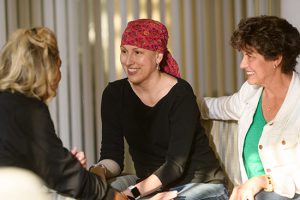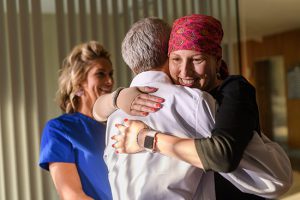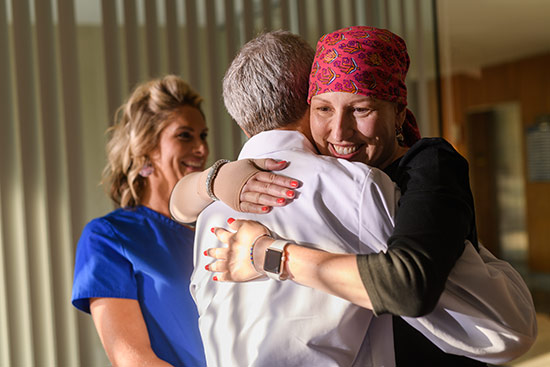Communication is Key
Cancer Survivor shares story
April Nease was 39 years old when she was diagnosed with Stage 4 breast cancer in 2014. April was director of development for the Saint Joseph Hospital Foundation and, through that work, was familiar with the cancer care team at CHI Saint Joseph Health. Knowing those doctors made her choice for care east.

“The cancer center has been our biggest support,” her mother, Brenda Nease, said. “We have had easy access to doctors, social workers, infusion nurses … we can always make a call, day or night.”
That availability is a comfort for April and her mom, who have gone through the ups and downs of treatments – surgery, chemotherapy and radiation – and multiple cancer diagnoses over the years. April’s initial diagnosis found cancer was in her breasts and liver; it metastasized to her brain, twice, to her uterine lining, and was most recently found in her lymph nodes and chest.
The flow of communication, April said, is “extremely important. Otherwise, you get online and you google what this symptom is. WebMD is telling you something and you’re freaking out and you have to wait two more weeks to have an official appointment with your doctor. But I felt comfortable calling and the nurses here … I know all of them now.”
No question is too “crazy” or too small, April said. “Like something I thought may have been a side effect or was just something I was feeling. Is that normal – I guess, is what most people want to know. Because if it’s normal, then that’s part of it and if it’s not, then how do we fix it?”
“Even though all of us here would rather not be a member of this club, we all learn something from each other.”
The staff shows genuine concern and interest at every encounter. When April comes into the infusion center, staff members will often ask about her niece’s soccer game … or about something she had done over the weekend – they make a connection to the patients.

And the staff knows what April prefers during her treatment. “They know exactly what chair I’m in and how many pillows I want…one pillow, two blankets.”
“I’m blessed with the care I receive,” April said, “everyone from the breast center where I was diagnosed, the infusion center where I see the girls twice a week …. They all make you feel very comfortable and are always concerned about how you feel.”
It’s also helpful that the staff is very transparent about what the treatments will entail and who will be involved. “They explain everything to you so you’re not sitting in a room thinking, ‘who are all these people?’” April said.
“It has sort of become a close-knit group of caring friends,” Brenda said.
While the diagnosis was devastating, and her journey a difficult one, April has never wavered on her choice of provider.
From the beginning, the procedures that she would receive has been made clear. “It’s an ongoing planning,” April said. “They plan everything and give you an idea of what’s coming up next. … To say that’s overwhelming would be an understatement.”
April is also thankful for the resources – especially the support group provided through CHI Saint Joseph Health. “It is so good and, even though all of us here would rather not be a member of this club, we all learn something from each other,” she said.
![]() After multiple surgeries and various treatments, April is back to twice weekly IV infusions. She strives to remain positive.
After multiple surgeries and various treatments, April is back to twice weekly IV infusions. She strives to remain positive.
“I know there are some people who feel worse than I do every day,” she said. “The fact that I’m able to get dressed and go and do what I do … I’m fortunate. I wish I could do more because I used to be very active – being outside and hiking – but you just have to stay positive.”
_______________________________________________________________________
This article also appears on page 16 and 17 of the Winter 2020 print edition of Hamburg Journal.
For more Lexington, KY, Hamburg area news, subscribe to the Hamburg Journal digital newsletter.
To advertise in Hamburg Journal, call 859.268.0945












